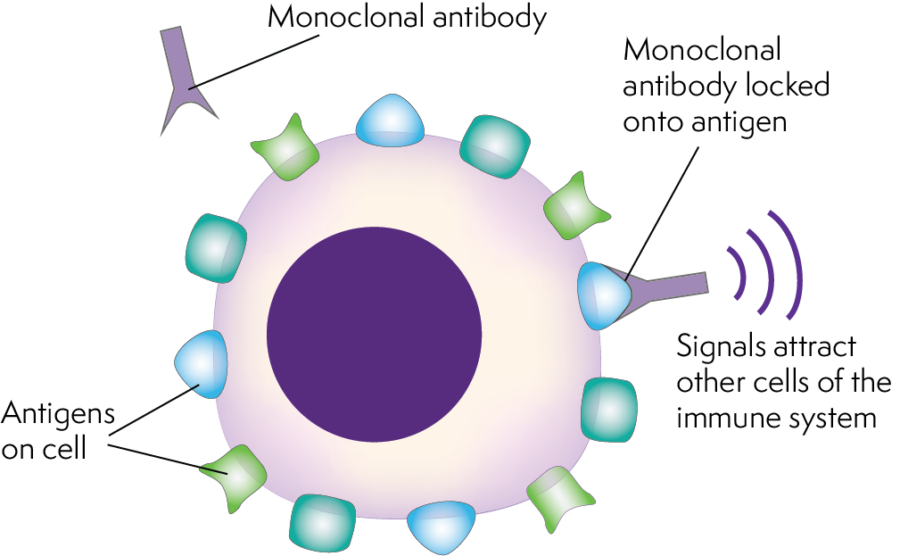
Antibody therapies are a type of immunotherapy and are also known as a targeted therapy. Other targeted therapies will be discussed on the ‘targeted therapy’ page.
What are monoclonal antibody therapies?
Antibody therapies or also known as monoclonal antibody therapy can be more specific therapy than chemotherapy. This means that they are directed at a specific target that is located on tumour cells, or in the immune system. Monoclonal antibody therapies are treatments that help your own immune system to fight cancers. These medications may be used with other treatments. There are different types of monoclonal antibody therapies that include:
- Monoclonal antibody therapy
- Antibody drug conjugate therapy
- Bispecific monoclonal antibody therapy
- Immune checkpoint inhibitors
- Chemokine inhibitors
How do monoclonal antibody therapies work?
One way the immune system attacks foreign substances in the body is by making large numbers of antibodies. An antibody is a protein that sticks to a specific protein called an antigen. Antibodies circulate throughout the body until they find and attach to the antigen. Once attached, they can recruit other parts of the immune system to destroy the cells containing the antigen.
Researchers can design antibodies that target a certain antigen, such as one found on cancer cells. They can then make many copies of that antibody in the lab. These are known as monoclonal antibodies (MABS).
Types of antibody therapy
Monoclonal antibody therapy
Some MABS work by recognising specific proteins on cancer cells, others target proteins on the cells of the immune system. Each MAB only recognises one protein.
Some MABS trigger the immune system to attack and kill cancer cells. Common MABs that work this way in lymphoma include:
- Rituximab (MabThera)
- Obinutuzumab (Gazyva)
- Alemtuzumab (Campath)
Antibody drug conjugate (ADC) therapy
Some MABS work in a more targeted way. They can block signals that tell cancer cells to divide. MABS can be used to transport other therapies to the lymphoma cells. These treatments include:
- Brentuximab vedotin (AdcetrisTM)
- Polatuzumab (Polivy)
Bispecific monoclonal antibody therapy
Bispecific monoclonal antibodies are a new type of monoclonal antibody. They work by binding to two separate types of antigens at the same time. There is a lot of research that is currently going into this new type of monoclonal antibody. A therapy that is currently being trialled in lymphoma is called ‘Mosunetuzumab’.
How are monoclonal antibody therapy given?
Your MAB treatment may be given intravenously (infusion) or subcutaneously (under the skin). How many treatments you receive depend on the type of MAB you are receiving and your type of lymphoma.
Common side effects of antibody therapy
- Allergic reaction during treatment
- Skin changes such as rash or red itchy skin
- Diarrhoea
- Tiredness
- Flu-like symptoms
Common antibody therapies used in lymphoma
To find out more about the monoclonal antibody that is relevant to you click on the section below:
- Monoclonal antibody therapy
- Antibody drug conjugates (brentuximab vedotin)
- Bispecific antibody therapy

